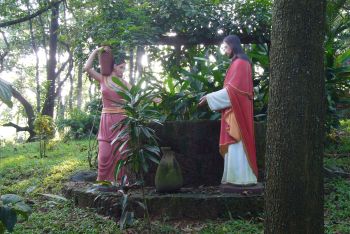Following on from several visits and meetings in recent years between bishops from the Mar Thoma Church and the Old Catholic Churches of the Union of Utrecht, a theological consultation with representatives from both sides took place during a pre-dialogue at the Santhigiri Ashram, Aluva, Kerala, India, from 7 to 11 November 2011. Three Old Catholic delegates (Bishop Johannes Okoro, Prof. Peter-Ben Smit and Dr. Adrian Suter) met to discuss theological matters with five delegates from the Mar Thoma Church: three theologians from the Mar Thoma Theological Seminary, the Rt. Rev. Dr. Zacharias Mar Theophilus (Suffragan Metropolitan), and the Rt. Rev. Dr. Isaac Mar Philoxenos.
The subjects of discussion were ecclesiology, baptism and the Eucharist. Prof. Smit held a lecture on ecclesiology, and Dr. Suter gave a presentation on the Old Catholic understanding of baptism and the Eucharist. Dr. K. G. Pothen gave two lectures on the Mar Thoma understanding of the church and of the Eucharist, and Rev. Sam Koshy outlined the topic of baptism as seen by the Mar Thoma Church.
In his remarks, Dr. Pothen explained the ecclesiology of the Mar Thoma Church from the perspective of its historic identity. He described the church’s roots in the St. Thomas tradition and in the Syrian Orthodox Church, and the tremendous importance of the Syrian church fathers. He also outlined the Jacobite influence in the days of Portuguese colonialism and the church’s emancipation from it during the reformation under Anglican influence. Prof. Smit focused in his lecture on the statute of the International Bishops’ Conference, illustrating how it reflects the understanding of the Old Catholic Church’s structure headed by a bishop and a synod council. Dr. Suter described the Old Catholic understanding of the sacraments in general terms before going into more detail on the sacraments of baptism and the Eucharist, common points of theological dispute, the Old Catholic position, and practical aspects. Rev. Koshy spoke about the importance of certain elements and symbols of baptism, illustrated by the Mar Thoma baptismal liturgy. He emphasized that baptism means acceptance into succession and discipleship. The Eucharist, which in the Mar Thoma Church is called “Holy Qurbana” in the Syrian tradition, was the subject of a presentation by Dr. Pothen. During a service of the Eucharist led by Bishop Philoxenos, the connection between the Eucharist and the forgiveness of sins was a focal point.
Each lecture was followed by questions and a discussion. The general experience was that each delegation was easily able to recognize itself in the presentations of the other. Praise was expressed for the speakers, especially from the delegates of the other church. Leaving aside the inevitable differences in forms of expression, the participants were very pleased to have reached consensus in factual matters. The topics discussed at the consultation have often provoked heated ecumenical debates in the past, but happily this was not the case here.
As well as the subjects of the lectures, the consultation covered a wide range of other aspects from Christological dogma and the ordination of women to the veneration of saints and the relationship between scripture and tradition. These topics will need to be discussed in more depth at future consultations, but the initial exchange of views was highly encouraging. Divergences appeared to be smaller than expected, and the delegates agreed that differences in practical interpretation should not call into question the shared theological standpoints. In areas where views diverge (which, as we know, can be the case even within the Union of Utrecht), the consultation delegates firmly believe that the differences will not be a separative force between the two churches.
Also under discussion were the aims and methods of ecumenical dialogue. The common ground identified by the delegates shows that a form of communion between the Mar Thoma and the Old Catholic Churches (to be set out in more detail in future consultations) is a desirable and realistic goal. In terms of methods, the delegates recommend the sharing of official and theologically representative documents and writings, and the establishment of a joint dialogue commission for further discussions.
A key finding of the consultation is that the two churches share an interest in ecumenical dialogue. The seniority of the Mar Thoma delegates, their careful preparation for the consultation and their lively interest in discussions with the Old Catholic Church showed that the Mar Thoma Church has a genuine, serious interest in following an ecumenical path with the Old Catholic Churches of the Union of Utrecht. The Old Catholic delegates believe that this path is also in the interest of the Union of Utrecht, which needs to forge more links beyond the European context in a globalised world. In their concluding declaration, the consultation participants from both sides recommend continuing the course pursued so far and expanding the theological discussions on topics including those mentioned above.
Dr. Adrian Suter

